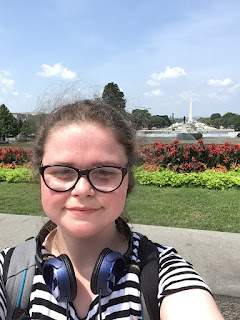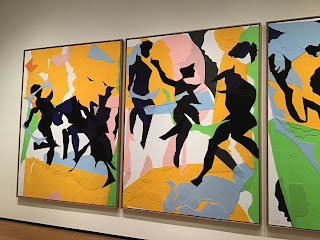Finished 16 June, ARC from Netgalley, review here. 3/5.
Ricochet - Kathryn Berla
Finished 27 June, ARC from Netgalley, review here. 2/5.
How to Lead When You're Not In Charge - Clay Scroggins
 Rating: 1/5
Rating: 1/5Source: Library Borrowbox app
Date finished: July 1
Pages: 214
This is the second of three leadership ebooks I checked out of the library because Laidlaw has apparently got into my head, but unfortunately it was not good and I just rushed through it to tick it off the list. I know I'm not naturally authoritative so I was hoping to get help with that, but this was about leading when you haven't been designated the leader. In my defence, it did say it would help when you lack authority.
Unfortunately, it turns out the author is a pastor so it was full of Bible quotes and anecdotes scattered with the very occasional good point.
The Quiet at the End of the World - Lauren James
 Rating: 4/5
Rating: 4/5Source: Library Borrowbox app
Date finished: July 7
Pages: 352
Teenagers Lowrie and Shen are the youngest people left in the world, born from IVF and living in a world where everyone else is 80+. Over a hundred years ago, a virus made humans infertile, and gradually everyone else died out. Now Lowrie and Shen have London to themselves and 300 other people.
The story is mostly told through the experiences of Lowrie and Shen, but there's also a lot of Lowrie reading through old Facebook posts by people living at the time the virus struck. These were very poignant and realistic, especially the posts urging people to sign a petition to make the government fund fertility research at higher and higher levels.
I really liked this book - I had loved Lauren James' The Loneliest Girl in The Universe - and it keeps making me think long after I finished it. I'm not sure what I think of how it ended but it's definitely worth a read.
The Martian - Andy Weir
 Rating: 5/5
Rating: 5/5Source: Library Borrowbox app
Date finished: July 11
Pages: 369
I LOVED this. It's about a guy who gets stuck on Mars after his fellow astronauts leave, thinking him dead, and has to figure out a way to survive there longterm until he can be rescued.
I loved this because it’s the only novel I’ve come across that felt like it was written for scientists. It wasn’t filled with equations but just little things like ‘I need to get twice as much hydrogen for water’. Weir could easily have made it a melodramatic survival story but he didn’t: every so often Andy would hit an obstacle and just methodically come up with a plan to fix it, which was fantastic. I loved how the book laid out the thought processes. Some of the book is told from the perspective of NASA as they try to get in touch with each other, and the book did that remarkable thing where I resented switching away from Andy’s perspective but then resented switching back! Brandon Sanderson is great at that.
Funnily enough, when I went to the NASA festival in DC I asked a few of the NASA employees how they felt about it and apparently they all love the author and he spent loads of time there while writing it.
Communicate Like a Leader - Dianna Booher
Rating: 2/5
Source: Library Borrowbox app
Date finished: July 19
Pages: 208
I didn’t love this book, as it was very corporate-focused, but it did give specific instructions throughout rather than waffling on, which I appreciated it. I did not appreciate the fact that a lot of the instructions were unfriendly to autistic people, being phrased as something like ‘Successful leaders can read body language’. I mean, quite possibly true, but phrasing it as something you do rather than something you are or currently have the ability to do would have been nicer.
Alanna: The First Adventure - Tamora Pierce
Rating: 4/5
Source: Bought for Kindle
Date finished: July 24
Pages: 274
This was a fun MG read, and I'm glad I picked it up after seeing it recommended on Reddit. It's about a girl who disguises herself as her twin brother so she can train as a knight.
I'm not sure what to say about it, really, except that it was an enjoyable, comfy read, with nice friendships and a fun school environment. I also found it very refreshing that it's very 'tell-y' - writers are always being told to show and not tell, but this story takes place over years so it frequently says things like 'Spring passed and Alanna learned how to do X' - it felt like an oral story and I actually really liked it.
It's weird how so many of the people whose struggles welike to read about are people who are already born into nobility, like Alanna, or who are born with magic instead of getting it through hard work.
(Also, something interesting - I've just started a Holly Bourne book. Holly Bourne has been raved about as an amazing YA writer but so far I'm super frustrated by the teenage girl voice, all oh my god he's so cute, like a sexy ferret - same reason I never read Angus, Thongs and Perfect Snogging, I don't want that overexcitable caling everything supercalifragilistic thing. The book reads incredibly young. Yet this book, which is for a younger audience since it's MG, wasn't like that at all. The characters behaved relatively young but weren't annoying. What gives?)
Creating Extraordinary Characters - Angela Hunt
 Rating: 1/5
Rating: 1/5Source: Found on my Kindle app - might have been a free download at some point years ago?
Date finished: 28 July
Pages: 44
This is extremely short, so I'm embarrassed calling it a book but it was listed on Goodreads as one. This had the odd interesting point, but oh my god. The method for developing characters was .... *drumroll please* MBTI!
And look, MBTI is fun, and it doesn't matter that it's not scientifically accurate for a character. But this author put an incredible amount of faith in them, saying things like you know who to pair romantically by them having the opposite MBTI letters, and generally treating them as true. Like just so much, this was her main point. Also, she threw in a bit in the middle about villains thinking they're doing the right thing like ~'Millions of women think unborn babies can't feel pain'. Damn, is this a writing book or pro-life propaganda?
Because Internet - Gretchen McCulloch
 Rating: 3/5
Rating: 3/5Source: Bought for Kindle (and expensive it was too)
Date finished: 30 July (the day I had a timezone shift having arrived in Ireland from America the afternoon of the 29th and finished the book in the early hours of the 30th Irish time)
Pages: 336
This was interesting but a bit of a disappointment unfortunately, having followed the author on Twitter for ages. I was expecting it to be more example-based or at least about specific internet language, but the first few chapters were about dialects and the usefulness of the internet for linguistics in general. She's enthusiastic about internet linguistics because it's the first time we've had an easy source of informal writing (formal writing: books etc, formal oral: speeches, informal oral: chatting) to analyse.
I did like the later chapters, which went into specific internet things like expressing tone of voice with punctuation, emoji, and memes. For example, she looks into why young people send a message for each thought or 'utterance' (rather than using periods like with sentences) and old people use ellipses or dashes, and concludes that it's from postcards, and that people have always written with these pauses. Her history of the internet was also interesting, charting movement between Usenet, MSN, Myspace, Facebook and Instagram.
I didn't feel like I got particularly deep insight into memes and it was a bit repetitive talking about how they're about ingroup/outgroup dynamics). I also am not sure how supported some of her conclusions were. I know she is a trained linguist so she knows a lot more than me about that, but she'd say some things like 'so this must be because X' without really having done a causal experiment. However, she did have a long list of sources at the end that weren't mentioned in the text so I couldn't see them at the time and that judgement may be unfair.

































